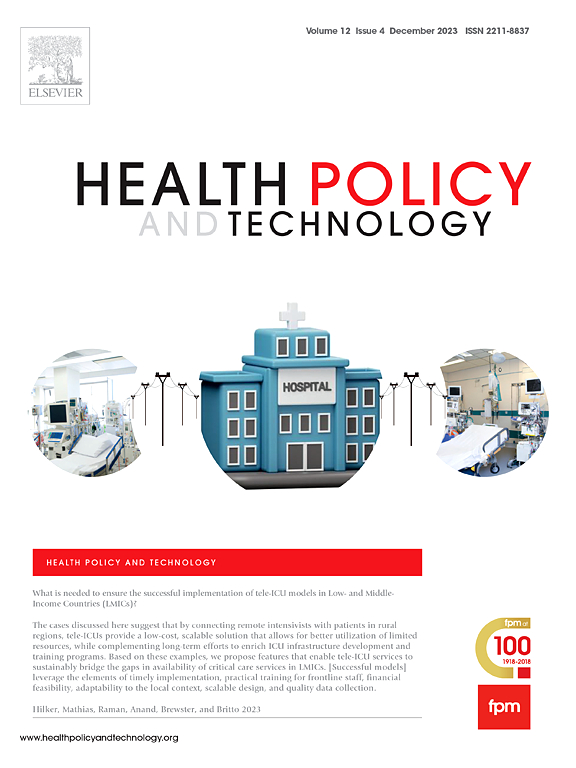评估西班牙足科诊所的可持续发展意识和实践:通往健康和可持续未来之路
IF 3.7
3区 医学
Q1 HEALTH POLICY & SERVICES
引用次数: 0
摘要
背景由于医疗保健行业对全球温室气体排放贡献巨大,因此该行业的可持续发展至关重要。医疗实践必须解决对环境的影响,同时保持高质量的医疗服务和公平的就医机会。在足病治疗领域,可持续实践可减少诊所的环境足迹,并通过促进预防和资源效率来改善长期医疗成果。研究设计横断面研究方法我们对 357 名执业足病医生进行了在线调查,他们均在西班牙足病医生总理事会注册,并拥有至少一年的专业经验。调查包含 26 个问题,主要涉及医疗保健的可持续性、足疗实践和环境影响。问卷包括封闭式问题和李克特量表项目。调查结果大多数受访者(82.6%)不经常使用公共交通工具,14%的受访者不进行任何形式的体育锻炼。一半以上的受访者不了解联合国可持续发展目标(SDGs)。几乎所有样本(98%)都没有测量过诊所的碳足迹,但有 34.7% 的样本计划优化诊所的能源消耗。总体而言,41.7%的诊所被归类为可持续发展程度低,56.9%的诊所被归类为可持续发展程度中等,1.4%的诊所被归类为可持续发展程度高。可持续发展实践符合全球环境医疗保健的紧迫性,可确保提供更负责任的足科服务。这项研究首次提供了有关这一问题的基线数据,可用于对全球足病医疗保健行业进行比较。本文章由计算机程序翻译,如有差异,请以英文原文为准。
Evaluating sustainability awareness and practices in podiatry clinics in Spain: A path toward a healthy and sustainable future
Background
Sustainability in healthcare is crucial due to the sector's significant contribution to global greenhouse gas emissions. Medical practices must address environmental impact while maintaining high-quality care and equitable access. In podiatry, sustainable practices can reduce the environmental footprint of clinics and improve long-term healthcare outcomes by promoting prevention and resource efficiency.
Study design
Cross sectional study.
Method
We conducted an online survey with 357 practicing podiatrists, all registered with the General Council of Podiatrists of Spain and with at least one year of professional experience. The survey contained 26 questions focused on sustainability in healthcare, podiatry practices, and environmental impact. The questionnaire included both closed-ended questions and Likert-scale items. Responses were scored and categorized into arbitrary sustainability categories: low (<12), medium (12 to 25), and high (>25).
Results
Most respondents (82.6 %) did not regularly use public transport, and 14 % did not engage in any form of physical exercise. More than half of the sample were unaware of the United Nations Sustainable Development Goals (SDGs). Almost all (98 %) had not measured the carbon footprint of their clinics, yet 34.7 % planned to optimise energy consumption in their clinics. Overall, 41.7 % were categorized as low sustainability, 56.9 % medium, and 1.4 % met high sustainability.
Conclusions
Podiatry clinics in Spain demonstrate low sustainability actions and knowledge. Sustainable practice aligns with global environment healthcare urgency, and ensures more responsible podiatric services. This study provides the first baseline data for this issue, availing comparisons across global podiatric healthcare sectors.
求助全文
通过发布文献求助,成功后即可免费获取论文全文。
去求助
来源期刊

Health Policy and Technology
Medicine-Health Policy
CiteScore
9.20
自引率
3.30%
发文量
78
审稿时长
88 days
期刊介绍:
Health Policy and Technology (HPT), is the official journal of the Fellowship of Postgraduate Medicine (FPM), a cross-disciplinary journal, which focuses on past, present and future health policy and the role of technology in clinical and non-clinical national and international health environments.
HPT provides a further excellent way for the FPM to continue to make important national and international contributions to development of policy and practice within medicine and related disciplines. The aim of HPT is to publish relevant, timely and accessible articles and commentaries to support policy-makers, health professionals, health technology providers, patient groups and academia interested in health policy and technology.
Topics covered by HPT will include:
- Health technology, including drug discovery, diagnostics, medicines, devices, therapeutic delivery and eHealth systems
- Cross-national comparisons on health policy using evidence-based approaches
- National studies on health policy to determine the outcomes of technology-driven initiatives
- Cross-border eHealth including health tourism
- The digital divide in mobility, access and affordability of healthcare
- Health technology assessment (HTA) methods and tools for evaluating the effectiveness of clinical and non-clinical health technologies
- Health and eHealth indicators and benchmarks (measure/metrics) for understanding the adoption and diffusion of health technologies
- Health and eHealth models and frameworks to support policy-makers and other stakeholders in decision-making
- Stakeholder engagement with health technologies (clinical and patient/citizen buy-in)
- Regulation and health economics
 求助内容:
求助内容: 应助结果提醒方式:
应助结果提醒方式:


